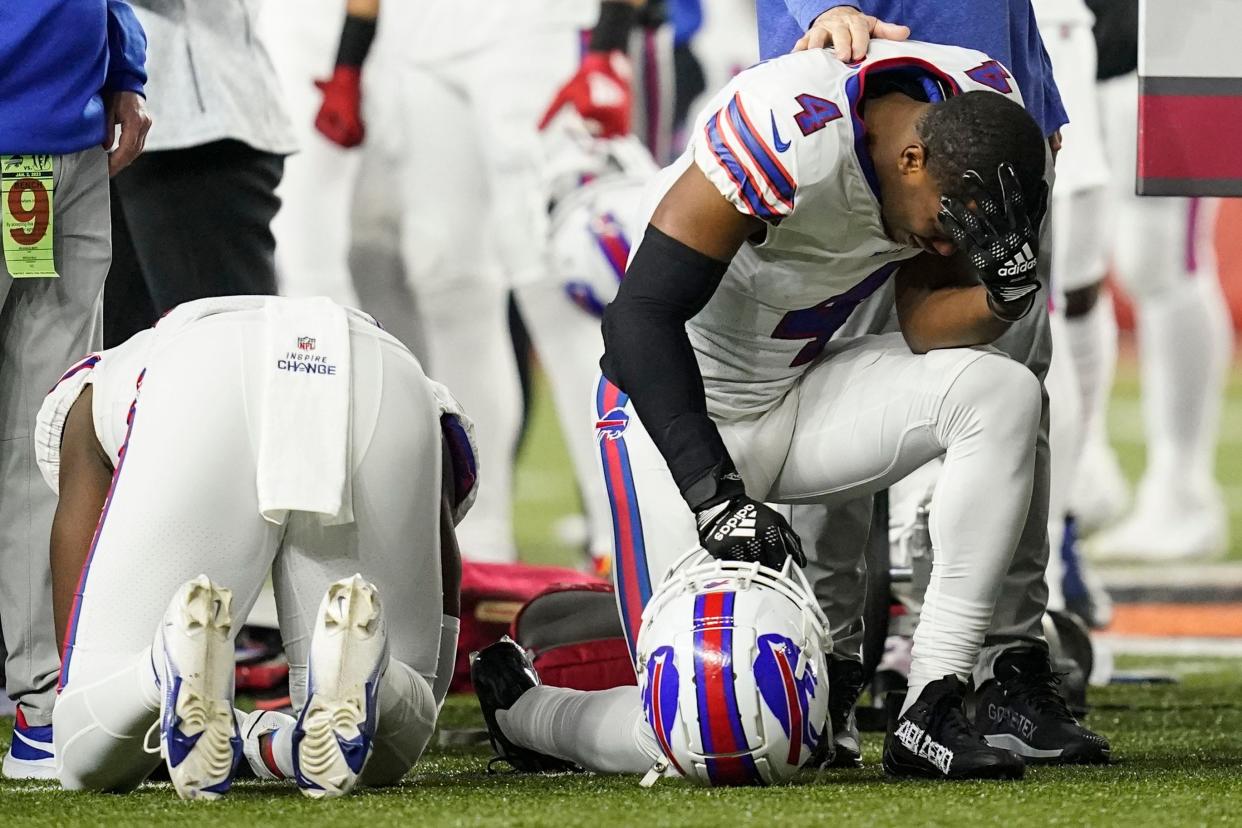Damar Hamlin's shocking collapse on MNF: Covering the 'extremely ugly' side of football

- Oops!Something went wrong.Please try again later.
- Oops!Something went wrong.Please try again later.
- Oops!Something went wrong.Please try again later.
- Oops!Something went wrong.Please try again later.
“We’re talking about life and death here. We’re getting further and further away from talking about football.”
That’s what Joe Buck, part of ESPN’s broadcast team for “Monday Night Football,” said after the Buffalo Bills’ Damar Hamlin collapsed on the field after making a tackle in the first quarter of the game between the Bills and the Cincinnati Bengals.
And he was right.
Emergency medical staff administered CPR for several minutes; Hamlin was taken by ambulance to a hospital in Cincinnati, where the game was played. The Bills later released a statement saying Hamlin suffered a cardiac arrest, "his heartbeat was restored on the field" and he is sedated and in critical condition.
It was agonizing, terrifying, surreal — the biggest shock during live coverage of an NFL game since Howard Cosell announced the death of John Lennon during a Monday night game in 1980. And that, obviously, was not something that happened on the field. Buck, Troy Aikman and the ESPN broadcast crew handled it with the shock and concern the situation warranted.
It took the NFL more than an hour to suspend the game after Hamlin collapsed
“This is as heavy as it gets,” Scott Van Pelt said on his ESPN show after the game was suspended — a decision that took more than an hour, to the chagrin of social media as well as the broadcast team.
“As has been said many times already, who cares” about the game now, Buck said as he and everyone else waited for the NFL to make a decision. Any decision, though the correct one was obvious.
“This is about Damar Hamlin, his health and how he is at the moment, and what his status is,” Buck said.
What took the NFL so long to come to the same conclusion?
You know the answer. Money.
NFL games are by far the biggest ratings winners on broadcast TV, and calling off a game calls off a lot of advertising revenue. The Bills-Bengals matchup was the most attractive game of the season for “Monday Night Football,” which has suffered through some awful games since Buck and Aikman joined ESPN before the season started.
Revolving door:Where is Joe Buck? Al Michaels? Here's where to find NFL announcers this football season
How CNN, Fox and MSNBC reacted to Damar Hamlin's collapse
Like with any breaking news story — and as soon as CPR was administered, this stopped being a sports story and absolutely became a news story — there was a frustrating lull once we learned all there was to know at that point.
CNN, Fox News and MSNBC all jumped in on live coverage and stayed with the story for hours. It soon became a waiting game, waiting for updates on Hamlin’s condition. This is a difficult part of reporting a story, particularly on TV, and in a competitive environment it can go wrong in about 50 different ways. Channel surfing isn’t a foolproof method of observation, but I didn't notice anyone at any of the networks jumping to irresponsible conclusions.
Big call:'Amazing.' Before calling Super Bowls, Al Michaels called a world record on ASU's track
Buck and Aikman were saddled with a lot of down time and little information — what Buck called “a holding pattern” — other than what they and everyone else had witnessed. That’s a particularly fraught situation, but they handled it well.
“I don’t think the players are going to want or be willing to go out and take the field until they know he’s OK,” Aikman said, later adding, “I just don’t know how any of these players can come out and play football tonight.”
Tragedy and shocking injury are not unknown to live sporting events. Joe Theismann’s famously snapped leg during “Monday Night Football” during 1985 was, for a generation, the biggest gut punch imaginable. In 1990 Loyola Marymount basketball player Hank Gathers collapsed on the court during the West Coast Conference tournament and died later that day.
Ryan Clark's perspective on ESPN was especially welcome
But the enormous popularity of the NFL made this feel different. You could tell in the way Buck, Aikman, Van Pelt and sideline reporter Lisa Salters talked about the situation and the reaction. They seemed shellshocked; at one point Salters’ voice cracked, understandably so — she was down on the field when Hamlin collapsed.
Ryan Clark joined Van Pelt on ESPN after coverage of the game ceased. He was outstanding. A former player, he pulled no punches. “Tonight we got to see a side of football that is extremely ugly,” Clark said. “A side of football that no one ever wants to see, or never wants to admit exists.”
We have to admit it now. It will be interesting to see whether this changes the way we watch. An incident like this is one of those things, as several commentators alluded to, that we know in the back of our minds can happen, but we assume won’t.
“This is not a football issue,” Van Pelt said. “It’s not a Buffalo issue or a Cincinnati issue or a sports issue. It’s a human being issue.”
As Clark suggested, it always has been. We just choose to ignore it.
No longer.
Reach Goodykoontz at bill.goodykoontz@arizonarepublic.com. Facebook: facebook.com/GoodyOnFilm. Twitter: @goodyk. Subscribe to the weekly movies newsletter.
Subscribe to azcentral.com today. What are you waiting for?
This article originally appeared on Arizona Republic: How TV covered Damar Hamlin's collapse on 'Monday Night Football'

